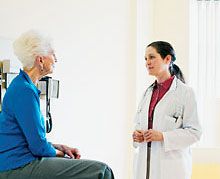July 29, 2009 | dentalproductsreport.com web exclusiveWhen patients know more than you The Internet makes it easy to find details on dentistry and oral health, but does access to m
July 29, 2009 | dentalproductsreport.com
web exclusive
When patients know
more than you
The Internet makes it easy to find details on dentistry and oral health, but does access to more information make for better patients and better dental care?
by Noah Levine, Senior Editor

Photo: Getty Images
Dr. Bruce Murphy recalls an encounter with one extremely self-educated patient who came to his operatory with a hand drawn diagram “in quite elaborate detail” showing exactly what he thought was wrong with his tooth and the procedure he wanted performed to treat the problem. Unable to convince this patient that his diagnosis and proposed treatment were both incorrect, Dr. Murphy found himself ready to throw in the towel.
“His solution was the most cockamamie thing in the entire world. Eventually I pulled the highspeed handpiece out of the hanger and handed it to him and said ‘have at it,’” Dr. Murphy said.
While the general practitioner who works out of practices in Schaumburg and Bloomingdale, Illinois didn’t actually let his patient begin working on his own teeth, Dr. Murphy said the story illustrates one of his worst experiences dealing with patients in the age of the Internet.
Self-diagnosing
Between 75% and 80% of Internet users have used the Web to search for health information according to 2007 study by the Pew Internet Project. While much of the online information can be useful for patients, not everything on the Web is completely accurate or unbiased, and when it comes to health information sometimes the details can be too complex to be easily understood.
Dr. Murphy likens patients who come to his operatory with a self-diagnosis to criminal defendants who choose to act as their own attorneys. A little information can be a great thing for patients, but if they are not willing to approach their dentist as an expert who can bring the benefits of both knowledge and experience to a case, the appointment will not go well for anyone.
“The biggest problem is patients who read one little thing and then get emotionally attached to it,” Dr. Murphy Said. “They basically go off half-cocked. They get a little teeny bit of info a lot of times from some god awful source and then think it’s the truth.”
Those patients can be extremely frustrating to work with, and Dr. Murphy said he sees six or seven a year who will not accept that their preconceptions about their oral health are incorrect. In those cases he politely suggests they seek a second opinion or find a dentist with whom they are more comfortable, and most of the time the patients thank him for referring them to a dentist who can meet their needs. Sometimes they even refer new patients his way and, “strangely many of them turn out to be great patients.”
Information’s upside
Not every clinician sees the influx of self-educated and self-diagnosing patients as a bad thing. As one of the authors of Nothing Personal Doc, But I Hate Dentists! (ihatedentists.com), Dr. McHenry “Mac” Lee literally wrote the book on doctor-patient communications, and he believes that even the people who find incorrect dental health information online can still be great patients because their search for answers is a sign they are thinking about their oral health.
The key is to reach out to patients on their own level, said Dr. Lee who practices in Edna, Texas when he isn’t travelling to speak about improving communication between doctors and patients. Even patients who arrive with faulty information have taken a big step by showing an interest in the details of their health care. If a clinician is confident without being overbearing, patients are likely to come around to the correct conclusion after being presented with evidence from their own mouths.
“I just think it’s wonderful. You hear them out, and then you can use their radiographs and their oral pictures to guide them to the correct answer,” he said. It’s irrefutable. If you educate them in the correct way they can’t argue with you. It’s there in black and white on the radiograph and in living color with the digital pictures.”
CONTINUED ON NEXT PAGE
{NEW_PAGE}
Questions and answers
As president of American Dental Marketing, Daniel A. “Danny” Bobrow, MBA, works with dental practices looking to improve patient relationships and case acceptance. One of his objectives is to help dentists be prepared to respond to patient inquiries in a way that turns their negative beliefs into positive truths.
“The key here is to understand the patient’s motivation and not prejudge it or them,” he said.
When Dr. Lee is treating a patient who comes armed with an incorrect self-diagnosis, he performs the exam, reaches his conclusion and then guides the patient to reach the correct diagnosis by asking his own questions. Dr. Lee said he is very comfortable explaining things in great detail because patients who show initiative by researching their oral health will choose the best course of treatment after the doctor explains things to them for a clinical perspective.
“A person that’s come in armed with information to me is a green light to have a very deep dialogue with them and tell them everything,” he said. “My whole deal is I’m going to educate a patient, but I’m going to let that next action be on them, not on me. I sleep better at night that way.”
Overcoming any preconceived notions and getting the patient to understand and agree to the proposed treatment can require different strategies depending on the patient. While some patients may be ready for a crash course in the intricacies of oral anatomy, Dr. Lee said others might require an easily understood analogy such as comparing a patient’s bone loss to trying to plant a fencepost in unstable ground before they are able to grasp the treatment their case requires.
The “best patients”
While Dr. Murphy often is frustrated by patients who show up thinking they already have all the answers, he too finds value in treating patients who arrive with some background knowledge about their oral health. When a self-educated patient remains open to having a dialogue with and learning from the dentist he or she becomes “the best patient in the world,” Dr. Murphy said. Those appointments might take some extra time, but patients who understand their oral problems are more likely to accept proposed treatments and follow through with follow-up instructions.
“I do think there is some benefit from some people knowing a little more about their health,” Dr. Murphy said. “I’m happy to answer their questions. Well informed patients are going to eat up more of your time, but once you’ve cleared up their concerns, they’re ready to go.”
Making time for dialogue
The time factor is one of the biggest considerations when seeing a patient who comes armed with an online dental education. Dr. Murphy said he now expects to spend a bit more time with his patients, so they can cover any details. He is happy to answer the questions his patients ask, and if they reference a Web site he often pulls it up on the computer in his office so he can review the same information as his patient. There are times he finds himself learning from his patients and others where reviewing the site gives him a chance to explain what the patient didn’t understand on his or her own.
Bobrow said this is exactly the approach that will work to win over patients. Patients who ask tough questions or bring new concepts, technologies or other information to a clinician’s attention should be appreciated and recognized for their contribution to caring for their own oral health.
“That’s often what the patient really wants anyway,” Bobrow said. “This way, instead of creating an adversary, you’ve formed an alliance or partnership of sorts, and isn’t building relationships based on common interests what growing your practice is all about?”
Taking this time to really talk with patients, answer questions and explain diagnoses and treatments is one of the most important things dentists can do, Dr. Lee said. Still it does take time that could be spent on treatment, so his practice employs a highly trained patient care coordinator who builds a rapport with patients, helps answer their questions and provides education while Dr. Lee is with other patients.
Dentists have gotten a bad reputation, and many patients who have had painful or unpleasant past experiences bring their fears and discomforts with them to their appointments. While technology and technique advancements are changing that paradigm and making dentistry far less invasive and uncomfortable for patients, dentists still need to inform patients of all the benefits of these advancements.
“They’re so impressed over all the modern stuff and when they find out what we can do, it’s just phenomenal,” Dr. Lee said. “It is extremely important that a dentist has a tremendous amount of continuing education and updates their office to all the modern technology.”
You can’t please everyone
While he advocates open communication and working with a patient to reach an understanding, Dr. Lee said the final decision about treatment is the patient’s to make. A clinician can advise the patient of the best course of treatment for long-term success, but a patient may choose to go another way for a number of reasons or no reason at all.
While he will never do anything that would be harmful or would not be in a patient’s bets interest, Dr. Lee said he will allow patients to choose materials for a procedure if, for example they are following holistic advice that decries certain materials. However, if a patient requests a material he does not normally use, he will have the patient purchase the material and then take home any unused material after he has concluded treatment.
Dr. Murphy said he too tries his best to work with patients who are very specific about treatments or materials. He said engineers tend to be especially picky patients because they are analytical by nature and ask endless streams of extremely detailed questions. Normally he will happily answer the questions to the best of his ability, but if he reaches a point where he can tell the patient is not open to his answers and is unwilling to work with him, he tries to shut things down, and that is when he recommends that particular patient seek another opinion. He said he is always game to try, but realizes he will never be able to please every patient who walks into his practice.
“You know you’re not going to be able to help them, and if you try it’s going to blow up in your face,” he said.
